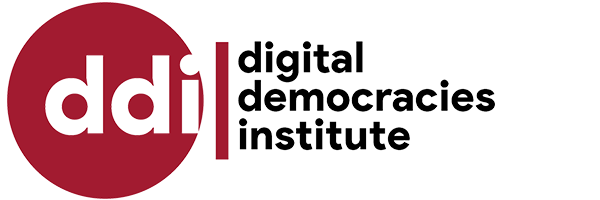As the convener of the new DDI research stream Indigenous Epistemologies, Dr. Karrmen Crey presented to the team some of the themes and direction that will shape the research. The work is grounded in Indigenous research epistemologies and ontologies that have been realized by practice, and are inseparable from the research itself. This research will be done by and with Indigenous researchers, in partnership with communities, on topics about relevant issues for those communities to produce knowledge about Indigenous peoples and experiences.
Karrmen discussed Santa Ono’s 2018 apology for Residential Schools at the opening of the Indian Residential School History and Dialogue Centre at UBC. She noted how this “apology marks the ongoing legacy and role universities play in this legacy. Our careers, our work, our capital is all at the expense of Indigenous peoples, through continued dispossession.” All universities in colonized countries have been, and continue to be responsible for training researchers who have impacted Indigenous peoples through colonial representations and dispossession, which perpetuates to this day.
Karrmen is developing frameworks for thinking about what the UBC apology acknowledges. She pointed to the Halq’emeylem word Xwelitem that originated from the mid-1800’s Gold Rush era that marks non-Native arrival, literally translated to “hungry ones” or “starving ones.” The word has a double meaning, as ones who cannot feed themselves on this land, but also those who cannot satisfy their hunger for gold. The term is used to refer to non-Indigenous people within Indigenous society. Within academia, Karrmen referred to Dylan Robinson’s notion of “hungry listening”, which includes settler-colonial forms of collaboration that are not reciprocal but rather extractive and self-interested. As such, within the academy we must reflect upon research practices and procedures which may perpetuate Xwelitem practices.
Xwelitem research practices
Karrmen discussed some Xwelitem research practices. First, non-collaborative research that does not involve meaningful consultation or engagement with Indigenous experts, research methodologies, and theory. This type of research seeks to fit Indigenous knowledge, philosophies, and being into Western and settler-colonial research programs, priorities, activities and analysis. Karrmen drew on the scholarship of Linda Tuhiwai Smith, author of Decolonizing Methodologies, to discuss the “relation between institutional practices of research and research practices themselves. The work of doing Indigenous research means transforming and renegotiating these practices.” This includes things such as research metrics, timelines, and evaluation. She identified some examples of common problematic practices, such as receiving articles to review on Indigenous topics without citing Indigenous authors, which should never make it past journal editors. Another example is where Indigenous academics are asked to contribute to grant proposals involving Indigenous research that do not involve Indigenous scholars or communities until right before the deadline. This is an example of tokenism, fitting Indigenous people into a research design and timeline that didn’t involve them. Lastly, she notes that during events where Indigenous guest speakers are invited, honoraria must be ready for the event in order to demonstrate the reciprocity of the relationship.
Karrmen noted that when these errors are made and pointed out, there is a tendency to withdraw to avoid discomfort. “There are a spectrum of behaviours symptomized by settler-anxiety, or Tuck and Yang’s settler moves to innocence, to relieve guilt or responsibility without giving up power or privilege”. She noted that “settlers must stay with that trouble because discomfort precipitates change.”
Karrmen explained that there is not a pan-Indigenous identity or people. However, reciprocity and relationality are bedrocks of Indigenous research methods. She explained the complexity of how pan-Indigeneity is used strategically in academia, due to the shared history of colonization and its consequences. “There were political histories and relationships and shared territory, but there are diverse, unique origin stories and ways of being in the world that don’t resolve into unity.”
Stó꞉lō Transformer Rocks
With that, Karrmen closed by discussing Jodi Byrd’s Transit of Empire and its relationship with Stó꞉lō Transformer Rocks. For Byrd, land is pneumonic in synthesis of its complex relationship with epistemology and ontology. She explained Byrd’s conceptualization that “land is our ancestor. It remembers. It determines kinship by beings that occupy it and the relations between human and non-human beyond anthropocentric epistemologies. Land encodes these relationships.” Karrmen explained how Transformer Rocks encode Stó꞉lō laws and history. People and things were transformed into stones as a lesson if they were doing something wrong. Steven Point, Stó꞉lō judge and now UBC chancellor said that these “stone figures represent values, because it was turning the world right by resolving transformations that represent lessons, rules and values.” Karrmen added that “these are our values and constitution: the material places and spaces, not a piece of paper. We have an obligation to protect them, to listen and to learn.”
Karrmen notes that in the future of the Indigenous Epistemologies research stream and the DDI we will have ongoing conversations around developing good relations based on mutual respect and recognition in light of the historical and ongoing harms of university-based activities. The goal is to establish a reciprocal research network based on Indigenous philosophies of the future and technology. We are excited to situate this research as a node within such network that is already forming.
